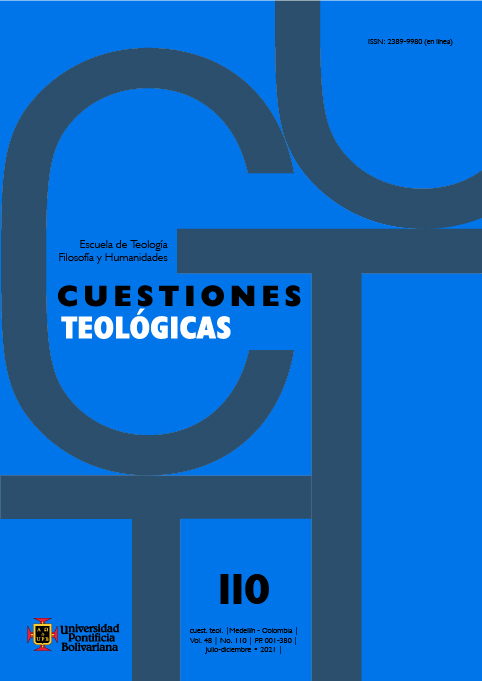For an increasingly necessary interreligious dialogue in the face of intolerance and violence
Main Article Content
Abstract
Religions were born to be a source of peace, enlightenment and liberation. Yet, their historical realization has been and is still marked by dynamics of aggression and confrontation, of violence and destructive intolerance of the other. This is the most problematic situation to which religion is called to respond effectively. This requires more than at any other time in history an authentic interreligious dialogue for the plurality of our current societies and of our globalized world. This dialogue, which is more than simple tolerance, has certain presuppositions that are marked by the recognition that all religions are true because they are ways of salvation; therefore, they have a part of the Truth, which is one, but which none of the religions exclusively possess. God is always greater than any religion can say about him. Fleeing from syncretism and confusion, since the dialogue is carried out from the different identities, each religion must recognize that it is a different way to achieve the only goal. That is why a dia-logos is necessary in recognition that our particular truths (logos) must always be on the way (dia) in search of the only Truth.
References
Andrés Suárez, E. y Esteban Garcés, E. (eds.) (2019). Hacia una teología de la interioridad. PPC.
Berger, P. (2002). Globalization and religion. Hedgehog Review, 4(2), 7-20.
Bermudo de la Rosa, M. (1982). Antología sistemática de Marx. Sígueme.
Bosch, J. (1991). Para comprender el ecumenismo. Verbo Divino.
Cullman, O. (1986). L’unité par la diversité. Cerf.
Machado, A. (1973). Poesías completas. Espasa-Calpe.
Marx, K. (1970). Contribución a la crítica de la filosofía del derecho en Hegel. En Anales franco-alemanes. Ariel.
Moing, J. (2005). Dios que viene al hombre. Vol. II: Del duelo al desvelamiento de Dios. Sígueme.
Moing, J. (2010). Dios que viene al hombre. Vol. II/1: De la aparición al nacimiento de Dios. La aparición. Sígueme.
Nhât Hanh, T. (2001). Bouddha et Jésus sont des frères. Reliés.
Pablo Obispo. Vaticano II. Lumen gentium. Nov 21 de 1964. http://www.vatican.va/archive/hist_councils/ii_vatican_council/documents/vat-ii_const_19641121_lumen-gentium_sp.html
Panikkar, R. (1970). El Cristo desconocido del hinduismo. Marova-Fontanella.
Panikkar, R. (1995). Invisible harmony: Essays on contemplation responsability. Fortress Press.
Panikkar, R. (1999). La plenitud del hombre: Una cristofanía. Siruela.
Panikkar, R. (2005). De la mística: Experiencia plena de la vida. Herder.
Pérez Prieto, V. (2008a). Más allá de la fragmentación de la teología el saber y la vida: Raimon Panikkar. Tirant lo Blanch.
Pérez Prieto, V. (2008b). Dios, hombre, mundo: La Trinidad de Raimon Panikkar. Herder.
Pérez Prieto, V. (2014). La búsqueda de la armonía en la diversidad: El diálogo ecuménico e interreligioso desde el Concilio Vaticano II. Verbo Divino.
Pérez Prieto, V. (2016). Diccionario panikkariano. Herder.
Pérez Prieto, V. (2018). Los tres ojos del conocimiento en San Buenaventura: de la reductio bonaventuriana al pensamiento complejo de Edgar Morin y la perspectiva cosmoteándrica de Raimon Panikkar. En J. C. Barrera y L. F. Benítez Arias (eds.), Perspectivas sobre el pensamiento de San Buenaventura de Bagnoregio y otros estudios (pp. 215-248). Universidad de San Buenaventura.
Pérez Prieto, V. (2019). La interioridad en las tradiciones religiosas no cristianas. En E. Andrés Suárez y C. Esteban Garcés (eds.), Hacia una teología de la interioridad (pp. 95-140). PPC.
Rahner, K. (1969). Los cristianos anónimos. En Escritos de Teología. Vol. 6: Escritos del tiempo conciliar. Taurus.
Sesboué, B. (1999). Karl Rahner y los cristianos anónimos. Selecciones de Teología, 25.






